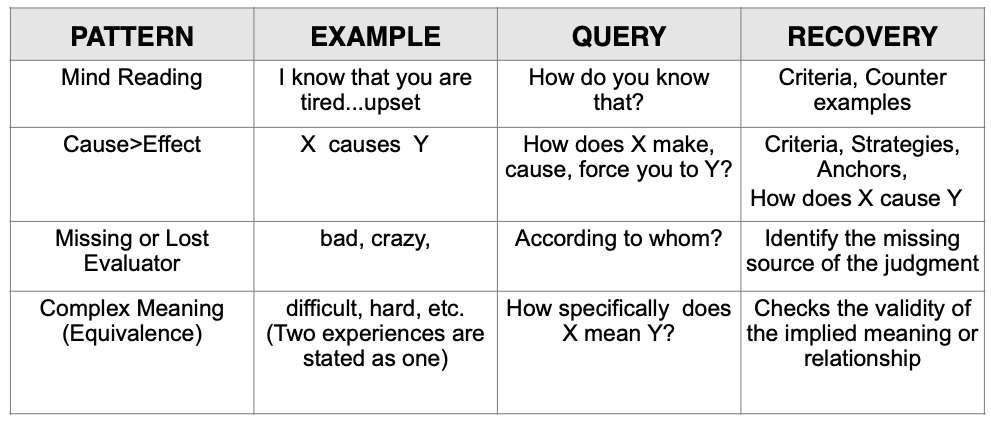MindBridge NLP Coach Certification Training
-
1 - Introduction to Professional Life Coaching and NLP8 Topics
-
Managers as Coaches
-
2 - Fundamentals of Influential Communication5 Topics
-
3 - a. Characteristics of Excellence in Communication2 Topics
-
3 - b. Submodalities
-
4 - a. Identifying Thinking Styles1 Topic|1 Quiz
-
4 - b. Rapport
-
5 - a. Values Clarification
-
6 - a. Anchoring Techniques2 Topics
-
7 - Clarifying Communication5 Topics
-
7 - a. Power of Questions
-
7 - b. Intake- Initial Pre-Coach Session
-
8 - Criteria3 Topics
-
8 - a. Perceptual Flexibility - Perceptual Position Quiz3 Topics
-
8 - b. Well-Formed Outcomes3 Topics
-
9 - 3 NLP Techniques Demonstrations
-
10 - Identifying Mind Maps
-
10- a. Meta Program Psychometric Quizzes
-
10 - b. Key Meta Program Patterns Explained7 Topics
-
10 - c. NLP Coach Session Demonstration
-
10 - d. Evaluation Forms -Outcome Coach Session
-
10 - e. Evaluation Video of NLP Coaching Demonstration
-
11 - NLP Coaching Sessions2 Topics
-
11 - a. Evaluation of Demo - Categories of Experience
-
11 - b. Directionalizing the Session
-
12 - Insights and Just for the fun of it!
Meta Model Distinctions – Ill-Formed Statement – Distortions
- Cause-Effect is a statement, which implies a causal link between a particular stimulus and a response. Listen for: ‘because’, ‘you/they make me’.
Examples of Cause-Effect are:
- “She made me so sad.”
- “His tone of voice makes me so angry.”
- “He caused me to yell at him.”
The Meta Model challenge to a Cause-Effect statement will identify the presupposed link (cause-effect) and can also recover complex equivalence and/or counter examples.
2. Mind Reading is a verbal pattern assuming knowledge of what another person thinks, feels, etc. It claims to know another’s internal experience.
Examples of Mind Reading are:
- “He doesn’t care about me.”
- “She did that on purpose.”
- “You don’t like me.”
The Meta Model challenge to Mind Reading identifies the criteria used to make assumptions about the other person’s internal state. It allows the speaker to question assumptions.
3. Missing or Lost Evaluators are verbal patterns of value judgments that leave out who performed the judgment and how it was made.
Examples of Lost Evaluators are:
- “It’s bad to be inconsistent.”
- “It’s selfish to think of your own feelings.”
- “That’s stupid.”
The Meta Model challenges to this pattern will recover the source of the value judgment, identify beliefs and generate awareness of other possibilities.
4. Complex Meaning (Equivalence) is a verbal pattern identifying when two experiences are interpreted as synonymous. It is a conclusion based on a belief that the outcome will always be the same.
Examples of Complex Meanings (Equivalence) are:
- “You’re yelling at me… you don’t care about me.”
- “He’s doing poorly in school… he has a learning problem.”
- “This material is too confusing… I’ll never learn it… I’m stupid.”
The Meta Model challenge to a Complex Meaning/Equivalence checks the validity of the relationship implied by the complex equivalence.
Distortions Recovery Chart

Responses
You must be logged in to post a comment.

They Meta Model of Distinction – Ill Formed Statements – Distortions
1) Category is Cause and Effect: a statement which implies a casual link between a particular stimulus and a response.
Example Listen for “Because” or “you / they made me”
“She made me so sad.” RESPONSE: “How does she make you so sad?”
“His tone of voice makes me so angry.” RESPONSE: “How does his tone of voice make you so angry?”
“He caused me to yell at him.” RESPONSE: “How did he cause you to yell at him?”
These examples demonstrate cause and effect recovery of complex equivalent and or counter examples.
2) Mind Reading assumes knowledge of what another person is thinking, feeling, etc., claiming to know the internal experience of another person.
Example:
“He doesn’t care about me.” RESPONSE: “How do you know that?”
“She did that on purpose.” RESPONSE: “How do you know that?”
“You don’t like me.” RESPONSE: “How do you know that?”
the Meta Model Challenge to Mind Reading – identify the criteria used to make the assumptions about another person’s internal state – ASK: How do you know that?”
3) Missing or Lost Evaluators – value judgements that leave out who performed the judgement and how it was made.
Example:
“It’s selfish to think of your own feelings.” RESPONSE: “According to whom?”
“That’s stupid.” RESPONSE: “According to whom?”
The Meta Model will recover the source of the judgement, identity, beliefs, and generate awareness of other possibilities.
4) Complex Meaning (Equivalence) identifying when two experiences are interpreted as synonymous. It’s a conclusion based on a belief that the outcome will always be the same.
Example:
“You’re yelling at me. .. you don’t care about me” RESPONSE: “How specifically does yelling at you mean that person does not care about you?”
“How specifically does X mean Y?”